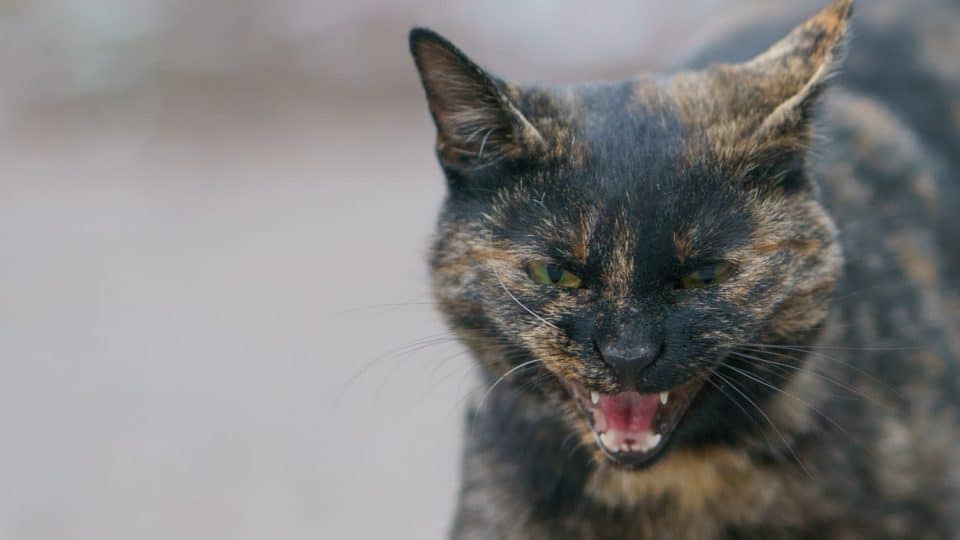- Not a substitute for professional veterinary help.
Rabies is a fatal nervous system infection that can affect any mammal, including cats. Rebecca Kurtzman, DVM, medical director of St. Marks Veterinary Hospital, says the first signs of rabies in cats include seizures, poor coordination, paralysis, and fear of water. These rabies symptoms require immediate veterinary attention, and the disease is often deadly.
The World Health Organization (WHO) has strict guidelines to control rabies, and vaccination is strongly encouraged in the United States. However, cats are the most commonly reported domestic animal with rabies in the US.
Rabies is serious, so knowing the signs and causes is crucial. Below, you’ll learn about the symptoms, which cats are most at risk, and what treatment looks like.
What Are Rabies Symptoms in Cats?
Rabies comes in stages. These three stages are the prodromal phase, the furious phase, and the paralytic phase. Rabies symptoms in cats during these phases are usually different. Generally, Dr. Kurtzman says any rabies symptoms can be related to behavior or the nervous system and include the following:
- Increased fear or aggression
- Changes in eating, drinking, and swallowing
- Seizures
- Poor coordination
- Paralysis
- Fear of water
- Fever
- Itchiness
- Increased anxiety
- Sensitivity to touch and sound
- Muscle twitching
- Increased salivation
These symptoms can signal various conditions, not just rabies. However, if your cat was bitten and they’re showing these signs, rabies is possible.
If your cat is experiencing any symptoms, Dr. Kurtzman recommends seeing a vet ASAP.
What Causes Rabies in Cats?
Generally, Dr. Kurtzman says rabies happens after an infected animal bites your cat. Additionally, cats have likely become the most common domestic animal with rabies because they’re not always vaccinated and are often exposed to wildlife.
Dr. Kurtzman also points out that many cats live indoors and outdoors, so they’re more exposed. Cats that roam increase their chances of encountering an infected animal because they hunt and have predatory instincts.
Lastly, bringing stray or feral cats into your home can increase the risk of rabies exposure without proper prep.
How Do Vets Diagnose Rabies in Cats?
Vets can’t definitively diagnose rabies in a living animal. If your cat hasn’t been vaccinated, is showing signs of rabies, and has been bitten, your vet will likely recommend euthanization. After their death, brain testing can confirm a diagnosis, says Dr. Laura Greene, DVM at Merck Animal Health.
She adds that cats can show signs of rabies anywhere from one week to six months after a bite. However, most cats will begin to display signs within one to two months.
Can You Treat Rabies?
Unfortunately, rabies is often fatal once symptoms appear. Humans who have been in contact with the cat should get treatment if needed.
Dr. Greene adds unvaccinated cats bitten by a rabid animal should be euthanized immediately per U.S. regulations or can undergo strict isolation for six months with no contact with people or other animals.
Can Humans Get Rabies From Cats?
Humans can get rabies if an infected cat bites them, but this is unlikely. Don’t worry; your cat can’t give you rabies by scratching or licking you.
According to the National Foundation for Infectious Diseases, only about 1-3 human rabies cases are reported in the U.S. each year, and it’s most often caused by bat bites.
If you’re unvaccinated and bitten by a cat with rabies, you’ll need to contact your medical professional for immediate care and vaccine treatment.
Why Are Rabies Vaccines Important?
While keeping your cat indoors and away from rabid animals can help prevent them from getting rabies, vaccination is the best way to keep them safe. Dr. Greene says the rabies vaccination for cats is critical since they are the most commonly reported domestic animal with rabies in the US. Although vaccinated cats can still get rabies, it’s unlikely.
Importantly, the animal rabies vaccine should only be administered by a vet or under veterinary supervision.
Your cat is immunized against rabies for 28 days after the first vaccination, protecting them from rabies until their next booster. While your vet can advise you on an ideal vaccination schedule, rabies vaccines are typically every 1-3 years.
Since rabies vaccines are important, don’t let the cost stop you from critical cat care. There are various ways to find low-cost, effective vaccinations in your area. Additionally, pet insurance is perfect for pet parents worried about vaccine and vet visit costs.



